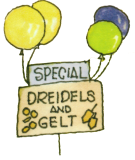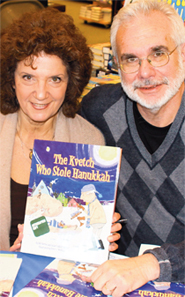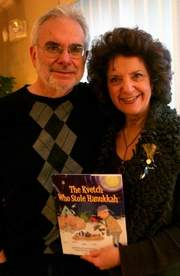The Kvetch Who Stole Hanukkah














The idea was the result of a bad back and a happy occasion. Ten years ago, in December 2000, we were visiting our son and daughter-in-law in Brookline, Massachusetts, after the birth of their first child, our second grandchild and first granddaughter. Bill had a bad back, and was resting on the floor to get some relief, while Susan was sitting nearby on the couch. Maybe it was the holiday season, the excitement of the new baby, or Bill’s need to “kvetch†about an aching back, but we began to play with the idea of a “kvetch who stole Hanukkah.†We were inspired by both Dr. Suess and Dr. Freud!!
We each wrote a few verses, and when we came home from Brookline we went out for dinner at a favorite local restaurant. With a bottle of wine to accompany our dinner AND inspire us, we wrote most of the story. The book was definitely a collaborative effort, and we completed it very quickly.
At that point, and even later, we were just having fun, with no intention of publishing a book. Susan took the text, sketched some playful rudimentary pictures, and created a binding for the story. Eventually, our grandchildren took the book to nursery school, and the other children seemed to like it a lot. Their parents (our children) would go to school when it was story time during the holiday season, and read the book to the class! We showed it to other members of the family and to a few friends, and again the response was very enthusiastic.
At our annual Hanukkah parties, The Kvetch Who Stole Hanukkah, along with Clifford the Big Red Dog wearing a yarmulke or skull cap (Bill in costume) were holiday staples!!
Actually, the only stanza that was slightly difficult was the first. Initially, the three children were named Lily, Kate and Joshua — — our first three grandchildren. Our own children turned out to be quite blessed and prolific, and eventually the number of grandchildren grew to eight, with a ninth one on the way even as we write this! We realized that we could not use the names of three grandchildren and exclude the other five. We decided to name one of the children, Vicki, after Susan’s 95 year old mother, to both honor her and continue her sense of wonder and joy!! Monica rhymed with Hanukkah and there are several Jewish girls and women named Monica, so it was a natural fit. Max was a name that fit the rhyme, but is also quite popular with many young families!
We like to think of him as Ziggy. One of the reviewers described the story as zany, and Ziggy seems to us like a variation of the word. It also brings back memories of our childhoods, in Brooklyn, NY. Both of us had friends named Ziggy and remember a restaurant of the same name. The cat is really the kvetch’s alter ego, forever happy while the kvetch is forever grouchy.
Susan grew up in a household in which Yiddish was spoken by both her grandparents. She understands and speaks Yiddish, and delights in the flavor of the language. The spoken Yiddish word did not guide us in writing the book, but a certain Yiddish sensibility did. A turn of a phrase and a playful way of looking at a situation, clearly impacted our writing!
We did not work directly with Peter Welling, and most of our input was through Pelican Publishing Company. Peter’s drafts were emailed to us and we sent back suggestions and comments, all of which were ultimately incorporated into the final book. Peter did a wonderful job with the pictures that make the book lots of fun to read. All of the playful tidbits and whimsical details (like the cat you asked us about) were solely Peter’s contribution, and he deserves all of the credit for these wonderful additions!!

October 21, 2010
Pair puts new twist on Hanukkah story
by Dave Benjamin
Staff Writer
The Kvetch is coming to Oyville and is spreading his disdain over the happy holiday of Hanukkah. But the Oyvillites know a way to dispel the gloom.
That is the focus of a new children’s book, “The Kvetch Who Stole Hanukkah,” written by central New Jersey authors Bill Berlin and Susan Isakoff Berlin, and illustrated by Peter J. Welling of Indianapolis, Ind.The husband and wife authors recently signed copies of their book and spoke with guests at Barnes & Noble, Freehold Township.

“It all came about 10 years ago when we were in Boston after the birth of our first granddaughter,” Bill Berlin said. “I had a bad back and was lying on the floor as Susan was sitting on the couch, and somehow or another the idea sort of germinated that it would be fun to do a story about ‘The Kvetch Who Stole Hanukkah.’ ”
Bill said he thought it would be a great children’s story for the holiday, and so he and Susan collaborated and wrote a few verses.
After returning from Boston, the couple celebrated their idea with dinner and a bottle of wine at a restaurant and then went home to finish the story.
“Our kids took it to school and read it there, and the other children liked it and we received a very good response from friends, and that was it,” he said. “That was back in 2001.”
At first there was no intent to have the work published, since it was written as a lark, but Susan decided to write a sample copy, and a few years later Bill sent out a few inquiry letters with a copy of the text, but no publisher responded.
However, 18 months ago the authors received a letter from Pelican Publishing Company, a Louisiana based publisher, expressing interest in the book.
“And the rest is history,” said Bill.
Susan explained that the story is about a kvetch, a mean person who is always angry and cannot see anything positive.
She said that although there are many wonderful things about Hanukkah, the real aim is to give children the opportunity to talk about their feelings, and therefore there is a need to find out why the kvetch is always mean and angry.
“This is a story of discovery and shows how children can help the kvetch,” she said.
Both authors grew up in Brooklyn, N.Y. Susan hails from East New York and Bill is a native of East Flatbush. Both attended Brooklyn College.
Susan, who also speaks Yiddish, is a licensed clinical social worker and educator. She has maintained a private psychoanalytical psychotherapy practice for 31 years. She is the author of articles about parenting, divorce, aging and bereavement.
“Bill and I have been writing poems and parodies for a long time,” said Susan. “And that’s when the idea for the story came when he shared his idea with me.”
Bill, a professor of political science at Montclair State University since 1975, is an Emmy award-winning television producer and is the senior producer of “Caucus: New Jersey,” and he is the host of “Carpe Diem,” a television show produced by Montclair State University. His writings include a book on Jewish political thought, as well as health care.
“Over the years, Susan and I have done a lot of songs and poems for family occasions and friends, and we always receive a good response,” Bill said. “I guess that was part of the inspiration for doing this book. It gave us the confidence in ourselves that we could do it.”
For more information, send an email to [email protected].

November 24, 2010
by Elaine Durbach
NJJN Bureau Chief/Central
Bill Berlin wasn’t identifying so much with Judah Maccabee as with the Grinch when he and his wife, Susan Isakoff Berlin, started composing their book 10 years ago.
The Edison couple was in Brookline, Mass., to visit their children and grandchildren around Hanukka time, and Bill hurt his back. Lying flat on the floor to ease the discomfort, he started making up rhymes, along with Susan, to create a Hanukka version of the Dr. Seuss classic about a grouchy cave-dweller determined to steal Christmas.
The earliest result was a home-made booklet, with some illustrations by Susan, with the young characters named after their three grandchildren, Joshua, Lily, and Kate. Family and friends loved the book, and the couple thought about getting it published, but found no takers.
A lot has changed since then. With five more grandchildren (and another on the way), they decided it would be grinchy to include those first three and none of the others, so they found three safer — and easy-to-rhyme — names.
And they found a publisher.
Neither Bill nor Susan is entirely new to the limelight. Bill, a political science professor at Montclair State University, is senior producer and writer for the PBS public affairs series Caucus: New Jersey and host of the MSU-produced TV show Carpe Diem. Susan is a licensed clinical social worker and educator who has taught in synagogue preschool programs, JCCs, and public schools. They have both had articles published in The New York Times and other publications.
Bill isn’t the kind of guy who looks likely to get over-excited. But, he said, when they got word that the Pelican Publishing Company wanted to publish The Kvetch Who Stole Hanukkah, he whooped with joy.
The pleasure increased when they got to see the illustrator’s work. Peter J. Welling does quirky, unbeautiful characters and at first, Bill said, he wasn’t all that pleased — but the illustrations rapidly grew on him. “He put in all these extra little touches — like the cats — and touches that would fascinated kids,” he said. “I love them.”
The book shares an outline with Seuss’ classic, but then delves deep to connect with other dimensions — like what makes someone a kvetch and what that can mean on a larger scale.
‘The deeper meaning’
“We wanted to create a family Hanukka book that could be used every year, but we wanted it to be something more than just facts about Hanukka,” Susan wrote in an e-mail to NJJN. That something more — “with a nod to Dr. Seuss, AND Dr. Freud” — was “an exploration of why people behave the way they do.”
That, they felt, was inherent in the story. “Over 2,000 years ago, Antiochus and his armies sought to ‘steal’ the soul and spirit of the Jewish people,” Susan wrote. “Unlike other oppressors before and after, Antiochus was not intent upon killing the Jewish people, but rather ‘killing their Jewish spirit.’
“Our Mr. Kvetch has a similar intention,” she continued, “but for very different reasons. And that’s what makes our book an excellent vehicle through which parents can help their children explore their own feelings and the deeper meaning of our Kvetch’s bullying behavior.”
Susan has drawn on her professional expertise to create a teacher’s guide — available on their website, www.mrkvetch.com, with material that can also be used by parents and grandparents.
At NJJN’s request, Susan and Bill asked their three eldest grandchildren how they felt about the book and the name changes. Susan reported back that “they understood why the names had to be changed in the “real published” book, because their brothers and sisters would be hurt if they were left out. But, each one also said, that “as beautiful and as exciting it is to see their grandparents’ book in bookstores, they will always ‘cherish the original.’”


EDISON — What began as a fun thing to do for an Edison couple has evolved into a published work that can be picked up at a local bookstore.
Bill Berlin and Susan Isakoff Berlin are the authors of “The Kvetch Who Stole Hanukkah,” a children’s book that’s tells about someone who steals all the menorahs in a town and takes them up to his house on a hill, only to have his perspective change when three children who followed him explain to him the meaning of the holiday.
“There’s actually a parallel process between our children’s book and the story of Hanukkah,” said Susan Isakoff Berlin, who runs a private psychotherapy practice in Highland Park and is a licensed clinical social worker and educator.
“Over two thousand years ago, Antiochus and his armies sought to “steal’ the soul and spirit of the Jewish people,” she said in an e-mail. “Unlike other oppressors before and after, Antiochus was not intent upon killing the Jewish peoples, but rather “killing their Jewish spirit!’
“Our Mr. Kvetch has a similar intention, but for very different reasons, and that’s what makes (the book) an excellent vehicle through which parents can help their children explore their own feelings, and the deeper meaning of our Kvetch’s “bullying’ behavior,” she said.
According to Bill Berlin, a political science professor at Montclair State University, the story idea — influenced by the well-known tale “How the Grinch Stole Christmas! ” — sprung to the couple’s mind about 10 years ago “as a kind of fun thing to do.”
“We started (writing it) in Boston after the birth of our second grandchild, came home, went to Tony’s Pizzeria and Restaurant in Tano Mall, Edison, took our regular booth, opened a bottle of wine and we finished the book that night,” his wife said.
Then, when the couple showed it around, they learned they might have a hit.
“We showed it to our kids and grandchildren, and they liked it,” Bill Berlin said. “My grandchildren took it to school, and everyone there liked it. … I think eventually so many people said they liked it, we began to take (publishing it) a little more seriously.”
About two years ago, he said, Louisiana-based Pelican Publishing Co. responded to one of the couple’s many query letters, saying it would publish the book.
“While we have always read the many wonderful Hanukkah books available to us as Jewish parents and then grandparents, we felt there was a niche that had not yet been filled,” said Susan Isakoff Berlin.
“We wanted to create a family Hanukkah book that could be used every year while families gathered in celebration of “The Festival of Lights,’ but we wanted it to be something more than the just facts about Hanukkah,” she said.

November 24, 2010
by Elaine Durbach
NJJN Bureau Chief/Central
Readers of The Kvetch Who Stole Hanukah will chuckle all the way through this Jewish parody of Dr. Seuss’s iconic How the Grinch Stole Christmas. The rhymes are clever as can be: What rhymes with Chanukah? A season enjoyed by Vicky, Max and Monica, of course.
Now, we all know that in the end, the kvetch (along with young listeners and readers of this picture book) will learn about the true meaning of Chanukah. It’s not just the gifts, the lights and the yummy latkes. It’s about the Maccabees’ spirit and the strength of our faith.
“In the town of Oyville, in a land far away,
The children prepared for each holiday.”
This book is a delight, and as a bonus, youngsters will also learn valuable Yiddish vocabulary:
“A kvetch is a person who likes to complain.
When others see sun, a kvetch will see rain.”